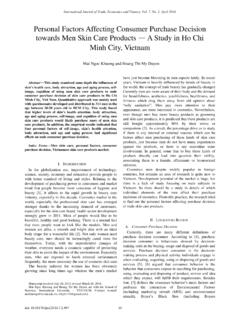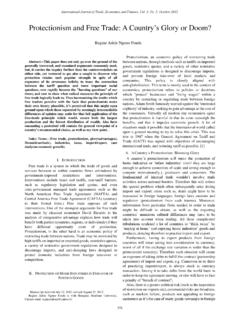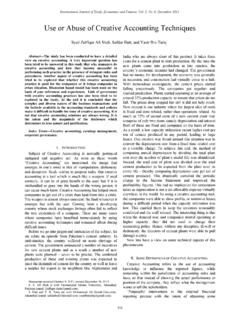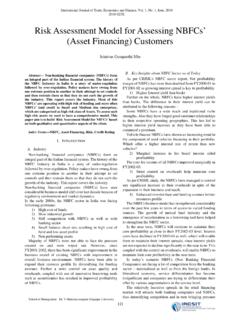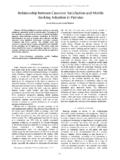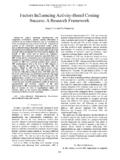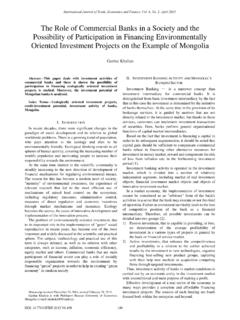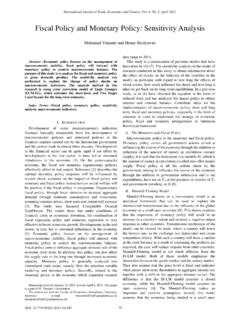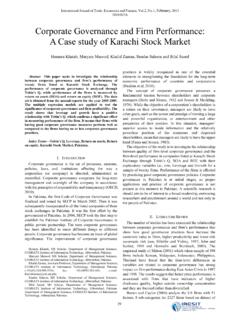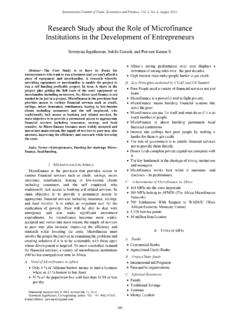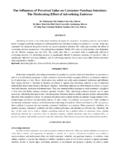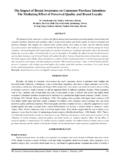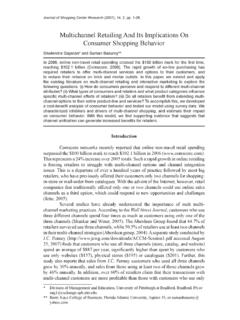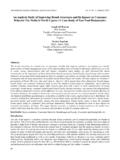Transcription of Towards Socially Responsible Consumption: An Evaluation …
1 International Journal of Trade, Economics and Finance, Vol. 1, No. 1, June, 2010 2010-023X 32 Abstract This paper attempts to examine the effect of religiosity and money ethics on Socially Responsible consumption . The exploratory research was conducted as a number of present environmental problems could be linked to consumer lifestyles and behaviour. A more sustainable and Socially Responsible way of consuming product and services would be impossible to achieve without drastic changes in consumer attitudes and behaviour.
2 The result of the study reveals that religiosity is a significant and main contributor to all the three dimensions of Socially Responsible consumption CSR performance, consumer recycling behaviour and environmental impact purchase and use criteria. However, in the case of money ethics, there is no significant relationship with all the three dimensions of Socially Responsible consumption . Index Terms Socially Responsible consumption , religiosity, money ethics, Malaysian consumers.
3 I. INTRODUCTION Recent research indicates that consumers are becoming more conscious to include ethical standard in their purchase decisions [1, 2]. Price, quality, convenience and value emerge to be the most important buying criteria for a large segment of US consumers [1] and products with an environmental or social appeal have an added advantage if they meet other competitive requirements. The study of Socially Responsible consumption is of critical importance.
4 The very definition of consumption often means to consume, waste, squander or destroy [3]. It is therefore not unexpected that the term consumption has become synonymous with environmental destruction in most corners of the globe [4]. A number of present environmental problems can be linked to consumer lifestyles. More sustainable lifestyles cannot be achieved without marking changes in consumer attitudes and behaviour [5]. Anderson and Challagalla [4] state that we live in a global village and can ill afford the negative legacy of consumption .
5 However, consumption need not be equated with environmental devastation and the squandering of natural resources. Despite the importance of this type of consumption , marketing researchers have largely neglected it. Except for a few early contributions [6,1] efforts have largely concentrated on ecological conscious (green) consumer behaviour or consumer boycotts. The broader concept of Manuscript received January 4, 2010. Teck-Chai Lau is with the Faculty of Accountancy and Management, Universiti Tunku Abdul Rahman, 43000 Kajang, Selangor, Malaysia (phone: 6016-391-7684; fax: 603-9019-7062; e-mail: lautc@ ).
6 Socially Responsible consumption has rarely been considered. Survey through the literatures has not reveal any studies that link one s belief and behaviour to Socially Responsible consumption . Therefore, the primary objective of the present study is to investigate the effect of religiosity and money ethics on Socially Responsible consumption . II. LITERATURE REVIEW A. Socially Responsible consumption Webster [6] defined Socially conscious consumer as a consumer who takes into account the public consequences of his or her private consumption or who attempts to use his or her purchasing power to bring about social change.
7 He based this definition on the psychological construct of social involvement, arguing that the Socially conscious consumer must be aware of social problems, must believe that he or she has the power to make a difference and must be active in the community. Webster s [6] research sets the foundation for the work in the field of Socially Responsible consumption (SRC). Roberts [1] defined the Socially Responsible consumer as one who purchases products and services perceived to have a positive (or less negative) influence on the environment or who patronizes businesses that attempt to effect related positive social change.
8 This definition assumes two dimensions: environmental concern and a more general social concern. Mohr, Webb and Harris [7] described Socially Responsible consumer behaviour based on the concept of Corporate Social Responsibility (CSR). One approach to defining CSR involves an attempt to list the major responsibilities of companies. They go on to define Socially Responsible consumer behaviour as a person basing his or her acquisition, usage and disposition of products on a desire to minimize or eliminate any harmful effects and maximize the long-run beneficial impact on society.
9 Webb, Mohr and Harris [8] developed the Socially Responsible Purchase and Disposal (SRPD) scale to reflect recent developments that occurred in theory and practice. Three dimensions of SRC emerge: (1) purchasing based on firms corporate social responsibility (CSR) performance; (2) recycling and (3) avoidance and use reduction of products based on their environmental impact. Francois-Lecompte and Roberts [3] developed a scale designed to measure SRC in France.
10 Their scale building process led to a five-factor SRC scale: corporate responsibility, country of origin preferences, shopping at local or small businesses, purchasing cause-elated products and reducing one s consumption . Towards Socially Responsible consumption : An Evaluation of Religiosity and Money Ethics Teck-Chai Lau International Journal of Trade, Economics and Finance, Vol. 1, No. 1, June, 2010 2010-023X 33B. Religiosity Religiosity is the extent to which an individual s committed to the religion he or she professes and its teachings, such as the individual attitudes and behaviours reflect this commitment [9].
